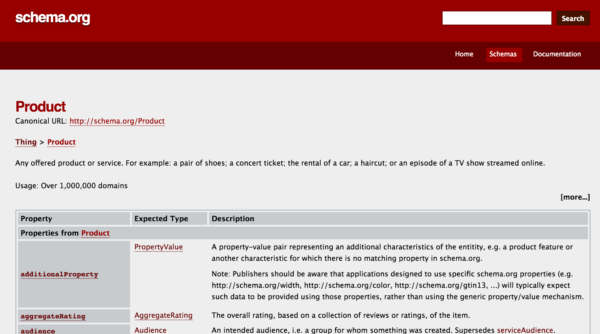What is structured data?

You might have heard about structured data, Schema.org, and JSON-LD. You might have even heard that it’s becoming more and more important to add them to your site. But what do these terms mean exactly? What is structured data? And what does it have to do with SEO? We’ll explain all of this, and how to get started, in this post!
What is structured data?
Structured data is a way of describing your site to make it easier for search engines to understand. To describe your site to search engines, you’ll need a vocabulary that presents content in a way that search engines can understand. The vocabulary used by the big search engines is called Schema.org, which translates your content into code that they can easily process. Search engines read the code and use it to display search results in a specific and much richer way. You can easily put this piece of code on your website.
Imagine you have a website with a lot of recipes. If you add structured data to a page with a recipe, your result in the search engines might change. It will be much “richer” regarding the other content that’s shown. That’s the reason we call these results rich results or rich snippets. Here’s what a rich result can look like:

Besides the title, the URL, and the description of the search result, you can see how long it will take to make the world’s best lasagna. Also, you’ll see how many calories the lasagne contains. You need to add structured data to your web page to get such a rich snippet. This also works for the products you offer in your Shopify online store.
In the following video, we explain what structured data is:
Want to know everything about structured data? Take our Understanding structured data training course! In this course we explain what structured data is in detail and how you can improve your chances of getting rich results. Get access to this course, all of our other SEO courses and extra features in Yoast SEO by going Premium:
There are lots of different rich results
There are all kinds of structured data. It’s always a code format. You have them for books, for reviews, for movies, and for products in your online store, for instance. In all cases, it adds more details to your snippet in the search results. Browse Google’s Search Gallery to see which rich results are powered by structured data.
We have to make one side note here. Unfortunately, Google does not always create a rich snippet of your page, even if you’ve added the structured data. There are no guarantees. So all you can do is add it to your page, and hope Google will pick it up!
But why do we structure data?
It’s quite simple, we structure data so computers can easily read, understand and categorize that information.
Structured data refers to data that is organized, while unstructured data is unorganized data. For instance, this sentence: “Marieke is the author of this post and she works at Yoast” contains unorganized data.
As humans, it’s easy for us to understand the sentence and information in it. Marieke is a person, she’s an author, she works at Yoast, and Yoast is a company. Search engines can also understand and organize this information, but it’s not immediately clear to them. They would need to do a bunch of analysis to reach the same conclusion as us, while we do that simultaneously as we read.
That’s because the above sentence contains ambiguous information. We know Marieke is a person because we see her author profile and we know Yoast is a company because it has a website and offers products. But to search engines, Marieke might be the name of a company, while Yoast may just be the name of the author. By structuring all this data, you disambiguate it to search engines, helping them to serve better information to searchers.
The need for structured data
As technology advances and the internet grows in size and complexity, the need for structured data also grows exponentially. While Google and other search engines become smarter and more advanced over the years, their resources are still limited. They only have so much time, processing power, and energy to distribute across all the activities required to keep search engines up and running. And they still struggle to serve the most helpful and relevant results to users’ queries.
Structured data can help take some work off search engines. When you add structured data to your pages, you facilitate search engines to serve better and richer results. You also help them save resources like processing power and energy which they can use somewhere else.
What do you do with structured data?
With structured data, you can “talk” to search engines. You can tell the search engines which ingredients there are in your recipe, you can tell them how long the preparation time is, and you can tell them how many calories the dish will contain. You can tell who made your Shopify products, for what price you sell them, and what people thought of them. Google will be able to grasp all that information instantly and can decide to show it in the search results.
Structured data is a tool you can use to tell Google detailed information about a page on your website. Then, Google can use this information to create informative, rich results. And audiences love these rich snippets.
What is Schema.org?
The big search engines have developed a project called Schema.org. On Schema.org you can find all the structured data markup supported by the search engines. This makes Schema.org a large collection of pieces of code.
You can use Schema.org to find the markup you need for your particular page. For instance, if you sell t-shirts on your Shopify store, you could show what color t-shirts you sell and what sizes you offer in your snippet. You should investigate Schema.org/Product and find out the possibilities. Yoast SEO for Shopify and WooCommerce SEO automatically add this for your products.
On Schema.org, you can copy code examples. After copying it, you’ll have to adapt the code to your specific preferences. You can also use SEO tools like Yoast SEO first-time configuration or the initial setup in Yoast SEO for Shopify to help you get started with structured data.

Schema.org is a taxonomy of code formats that the large search engines understand. You’ll find examples of what the code looks like. There are other forms as well. For instance Open Graph (used by Facebook) and Twitter cards (used by Twitter).
Read our history of Schema if you’d like to know more about how this came to be. Or check out the digital story we made on rich results, structured data and Schema.
Read more: Why Schema needs to be a graph »
What is JSON-LD?
JSON-LD is one of the markups of Schema.org. It’s just a way to write code. On Schema.org, you’ll also find other markups like Microdata or RDFa. At Yoast, we’ll advise you always to use JSON-LD, because it does not break your site as easily as other markups do. Plus, it’s the format that Google prefers. Yoast SEO automatically adds lots of structured data JSON-LD to your site. That’s not possible with the other markups.
Why is structured data important for SEO?
Structured data is important for SEO because it’ll make it easier for Google to understand what your pages, products, and your website are about. Google needs to find out what a page is about to show it in the search results. Using structured data is like talking to Google and telling Google what your site is about. That’ll help with your rankings.
On top of that, structured data will change the way your snippet (your search results) will look like. It’ll show more information to your customer. More specific information. And this will increase the likelihood a customer will click on your results. More clicks will eventually lead to even higher rankings! We’re seeing more and more structured data powered rich results pop up, so it is important to keep an eye on this.
How to use structured data?
Using it may sound complex, but everyone can do it as we made the essential pieces of structured data automatically available in our plugins. If you want to adapt or expand these, you might need some development skills. You have to get the correct code, you’ll have to adjust that code, and you’ll need a way to put it on your site.
We already have written a lot of posts about Schema.org and JSON-LD, which will help you to understand more about this subject. In addition, we’ve launched a free Structured data for beginners course to get you started and an Understanding structured data course that helps you understand this topic in even more detail.
No code hero? Use a plugin!
A lot of structured data markup can also be added to your website using plugins. As mentioned, Yoast SEO automatically adds the most important data for your site. You can even determine per page or article what type of content is on there. So, you can describe the Contact page on your site as being a ContactPage to search engines. You can do this by simply selecting the type in the Schema tab in the meta box or the block editor sidebar. In addition, you can use the free Yoast SEO content blocks to markup your FAQ pages and how-to articles with valid structured data.
Our local SEO plugin uses structured data to show your store’s location or multiple locations, while the WooCommerce SEO plugin improves the structured data of your products. The same goes for our Yoast SEO for Shopify app and we discuss this in the Shopify SEO ultimate guide.
You don’t have to write code to get that rich snippet, you’ll just use our WordPress plugins or Shopify app, fill out some details and we’ll do it for you. And there are many more plugins that’ll help you use structured data without the need to struggle with any code!
Keep reading: Structured data: the ultimate guide »


Discussion (1)